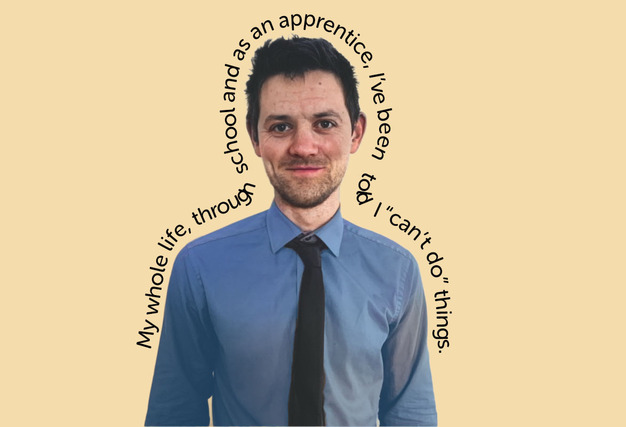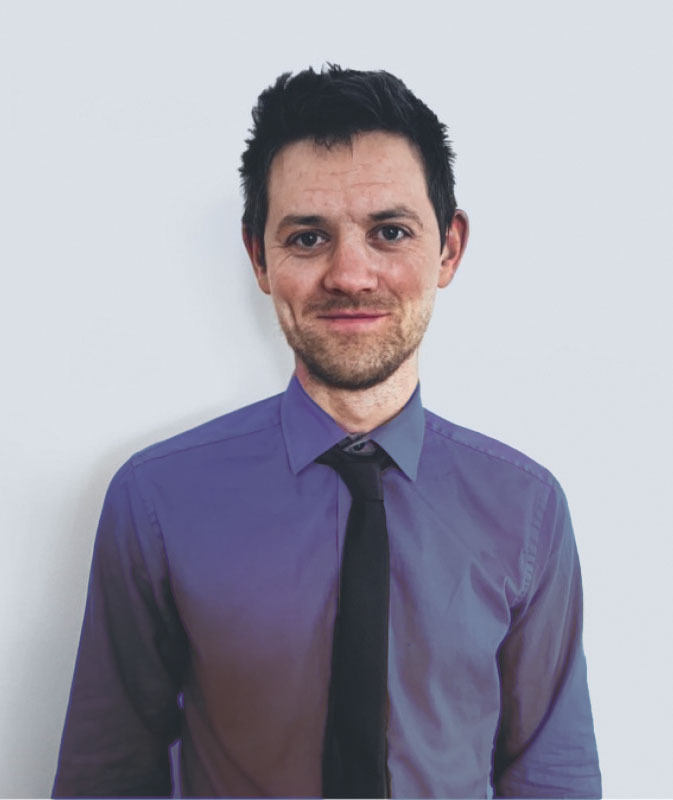Becoming Chartered: My APC story from a neurodivergent perspective

My whole life, through school and as an apprentice, I’ve been told I “can’t do” things.
I think hearing that perception over and over can sometimes lead to you believing it yourself. For me, it just makes me want to prove people wrong!
My route into surveying has been a long and often tough one, leaving school as I did with just two GCSEs under my belt. I’d been placed in the bottom set for English, having always struggled with that, and ended up being pushed down the more vocational work experience route.
I worked my way up though apprenticeships to become a fully qualified carpenter before, at the age of 25, doing access modules to be able to embark on a quantity surveying degree through UCEM (now the University of the Built Environment).
As challenging as some of that route has been, without a doubt, completing the RICS APC has been the hardest academic and professional challenge I’ve ever faced. For me, it wasn’t the written submissions, CPD logs, or case summaries that made it tough. You have time to work through those. The real hurdle was preparing for the final interview. As someone who is neurodiverse, the interview preparation process was particularly intense.
During my mock interviews, I struggled badly with freezing - not because I didn’t know the material, but because recalling detailed technical knowledge under pressure was incredibly difficult.
"I seriously considered deferring but the support from LionHeart was so beneficial"
That kind of cognitive block is something many neurodivergent people face, especially under stress. It knocked my confidence massively. I started to question whether I could do it at all.
To make matters worse, I was dealing with personal loss, with multiple bereavements in the lead-up to my final assessment.
This had shaken my focus completely. I actually seriously considered deferring but my partner encouraged me to go ahead. I’d received an email from RICS that mentioned support from LionHeart so I decided to get in touch.
The support I got from LionHeart was so beneficial. In fact, if it wasn’t for my support officer, Jonas, I don’t think I would have sat my final interview at all. He was so calming, at a time that I was so stressed. I put so much on it, this hurdle of passing my APC, that I was feeling so pressured. But the support I got with practising my presentation helped me feel more confident in my own mind and approach to my interview date.
On the day of the actual interview, something changed. I had been told I would be allowed extra time for questioning, to make the process more inclusive. I found the panel of assessors to be exceptionally fair, professional, and most importantly, supportive and understanding. They made the interview feel like a conversation rather than an interrogation. That made a huge difference to my confidence and ability to perform.
The APC is designed for experienced professionals, and it should be demanding. It tests not only your technical competence but also your leadership, decision-making, and strategic thinking. That level of scrutiny is necessary because it reflects the responsibility Chartered Surveyors carry.
"Don't let fear hold you back - it's tough, but achievable"
To anyone preparing for the APC, whether through the SPA route or another path, please don’t let fear hold you back. Yes, it’s tough. But it’s also achievable. If you’re neurodivergent, or facing personal challenges, know that you’re not alone and there is support out there.
My advice for anyone in a similar position would be to reach out to LionHeart - use that support. Notify RICS of any needs. There is a great deal of work being done to make the industry more inclusive, so use that support too.
In terms of what I would do differently if I had my time again… I’d have started my revision earlier! Make it much more of a marathon instead of a sprint, especially the ethics part.
I’m very happy to share my experiences in the hope that it will help other people. Since I first shared some of my journey on LinkedIn I have had so many messages, and I hope to work more with LionHeart to help others in future.
 Chris Lyford MRICS is a chartered quantity surveyor with a hands-on background in site management and joinery, and the founder and director of construction and surveying consultancy Ashington Hill. He works with LionHeart and the Dyslexia Association to champion neurodiversity and mental wellbeing in construction. He is also committed to using his business to help mentor people entering the profession - especially those who, like him, may not have taken a traditional path.
Chris Lyford MRICS is a chartered quantity surveyor with a hands-on background in site management and joinery, and the founder and director of construction and surveying consultancy Ashington Hill. He works with LionHeart and the Dyslexia Association to champion neurodiversity and mental wellbeing in construction. He is also committed to using his business to help mentor people entering the profession - especially those who, like him, may not have taken a traditional path.


